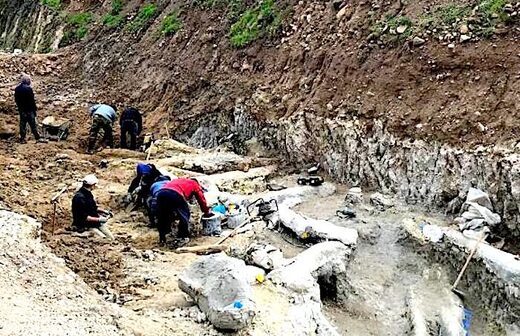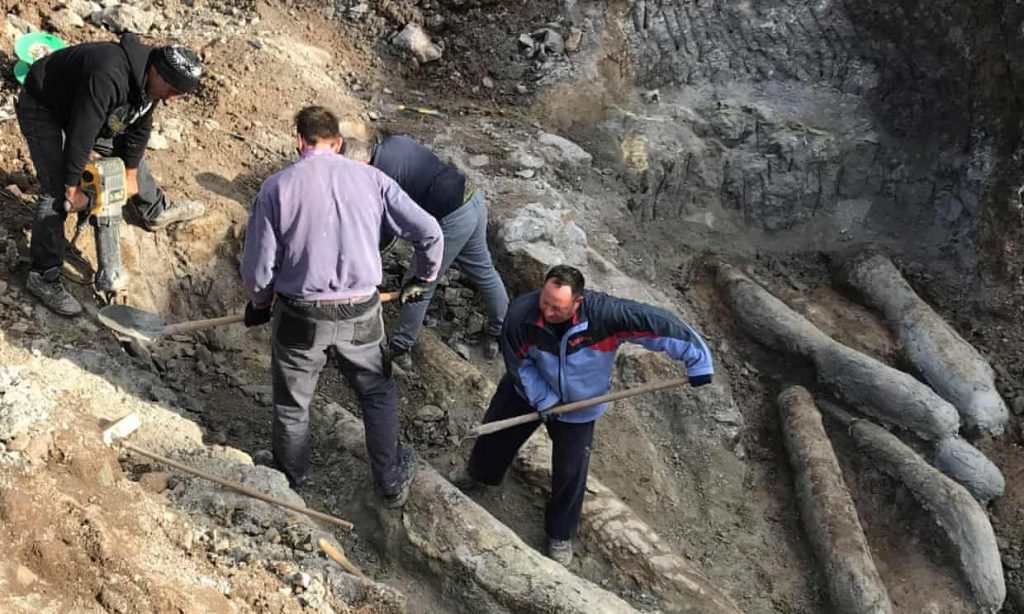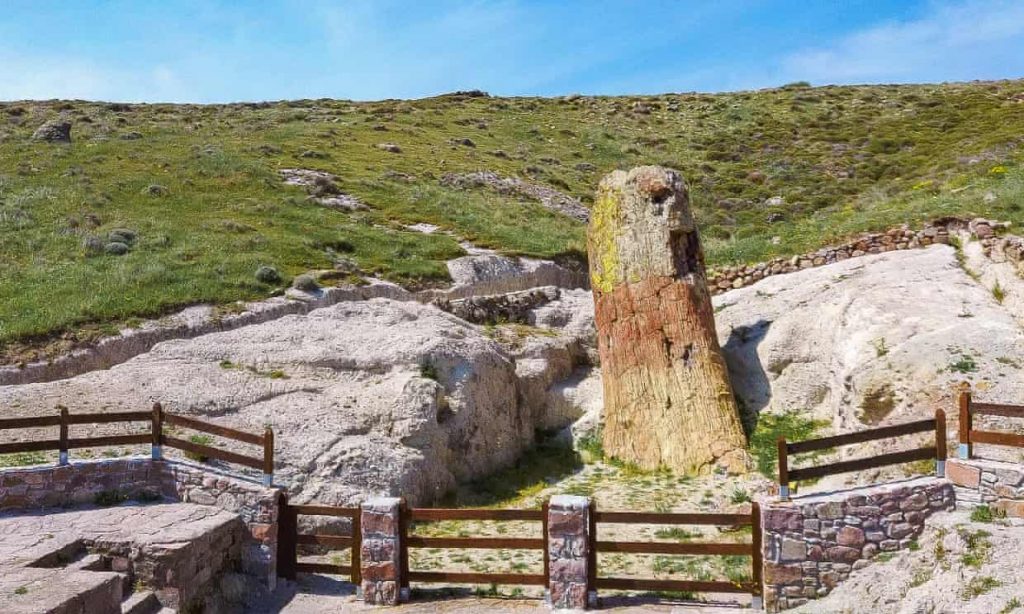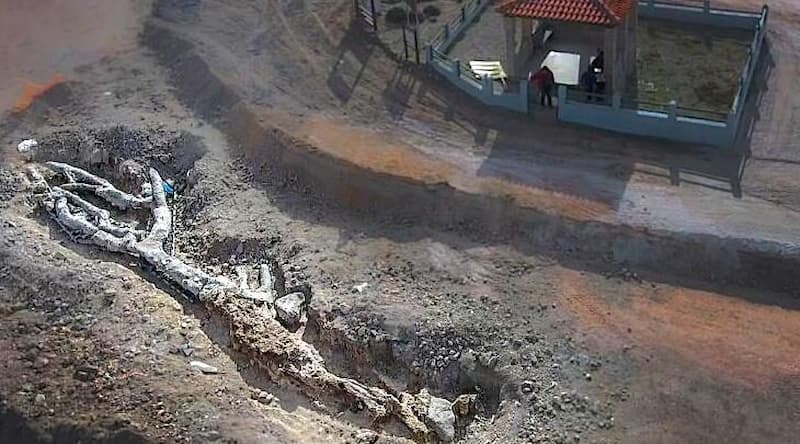(Strange Sounds) First came the tree, all 19.5 metres of it, with roots and branches and leaves. Then, weeks later, the discovery of 150 fossilised logs, one on top of the other, a short distance away.
by Staff Writer, February 26th, 2021
Nikolas Zouros, a professor of geology at the University of the Aegean, couldn’t believe his luck. In 25 years of excavating the petrified forest of Lesbos, he had unearthed nothing like it.
“The tree is unique,” he said. “To discover it so complete and in such excellent condition is a first. To then discover a treasure trove of so many petrified trunks in a single pit was, well, unbelievable.”
Stretching across almost all of the Greek island’s western peninsula, the petrified forest, a Unesco global geopark, is among the largest in the world.
Produced by successive volcanic eruptions, its vividly coloured fossilised trunks are a witness to the explosions that buried much of Lesbos under lava and ash between 17 and 20 million years ago.

Zouros, who heads the Museum of Natural History in Sigri, has spent decades studying the various forests that existed in the area at the time.
“The more we discover the more we understand past ecosystems,” he said. “The first forests that we know of were subtropical, a far cry from the Mediterranean vegetation on Lesbos today.”
Excavations by his 35-strong team along a 20km highway connecting Sigri with Kalloni, the region’s biggest town, since 2013 have yielded more than 15 significant fossil sites but the earlier finds have paled next to the most recent.

The discovery of an entire tree lying on a bed of leaves was not only unprecedented but down to pure luck. “Constructors were about to asphalt that part of the highway when one of our technicians noticed a tiny branch. The road work stopped, we starting excavating and quite quickly realised we had chanced upon an incredible find,” said Zouros. “It will now form part of the open-air museum we intend to create.”
Geologists around the world have described the find as a breakthrough. “We have a case of extraordinary fossilisation in which a tree was preserved with its various parts intact. In the history of paleontology, worldwide, it’s unique,” said the Portuguese palaeontologist Artur Abreu Sá. “That it was buried by sediments expelled during a destructive volcanic eruption, and then found in situ, makes it even more unusual.”

The climate emergency has highlighted the need to understand ecosystems in a hotter future if global temperatures are not reduced and, as such, Lesbos’s petrified forest offers an invaluable window into the past, said Prof Iain Stewart, who directs the Sustainable Earth Institute at the University of Plymouth.
“It’s a world-class place to look at the type of environment that existed 20m years ago,” he told the Guardian. “Finds like these are a window into a particular past, a greenhouse, hothouse world, that existed back then. They might be an indication of what is coming if we don’t get our act together in tackling the climate change emergency.”
In more recent times, Lesbos has been better known for the thousands of refugees who have landed on its shores but the island’s unusually diverse landscape and vegetation also draws scientists interested in its geological past.
“The petrified forest is the first stop on our fieldtrip,” said Chronis Tzedakis, a professor of physical geography at University College London, who has been running field classes on the Aegean isle for the past decade. “It never disappoints … These new finds are stunning. The tree with its branches still attached is a rarity, while 150 trunks recovered together will provide a snapshot of a forest community which will allow us to assess its biodiversity at one point in time.”
It was in Lesbos that Aristotle worked on the zoological studies that would become the canon of biological thought for the next 2,000 years.
Tzedakis has found himself pondering whether the philosopher who was invited to the island by his disciple, Theophrastus, was ultimately influenced by the geological wonder. The polymath, himself a student of Plato, spent two years there, much of it ensconced in the study of marine biology.
“I often like to think that Aristotle, who established the foundation of scientific inquiry while on Lesbos must have seen the petrified trees of Sigri,” he said adding that the similarity of some of the fossils to their living relatives may have inspired his theory of species being fixed and well-defined.
“Having grown up in nearby Eressos, Theophrastus, the ‘father of botany’, would have surely known about it and have taken the great man to see it.” [Guardian]
Organic Lion’s Mane Mushroom, proven to grow new brain cells and synapses. Guard against Alzheimer’s, dementia, and mental decline. Save 10% and get free shipping with a subscription!“I can feel my mind getting sharper with Lion’s Mane. I put it in my coffee.”
Get your Lion’s Mane from Ascent Nutrition, one of the most pure and potent in the industry.
Stillness in the Storm Editor: Why did we post this?
The news is important to all people because it is where we come to know new things about the world, which leads to the development of more life goals that lead to life wisdom. The news also serves as a social connection tool, as we tend to relate to those who know about and believe the things we do. With the power of an open truth-seeking mind in hand, the individual can grow wise and the collective can prosper.
– Justin
Not sure how to make sense of this? Want to learn how to discern like a pro? Read this essential guide to discernment, analysis of claims, and understanding the truth in a world of deception: 4 Key Steps of Discernment – Advanced Truth-Seeking Tools.
Stillness in the Storm Editor’s note: Did you find a spelling error or grammatical mistake? Send an email to [email protected], with the error and suggested correction, along with the headline and url. Do you think this article needs an update? Or do you just have some feedback? Send us an email at [email protected]. Thank you for reading.
Source:


Leave a Reply